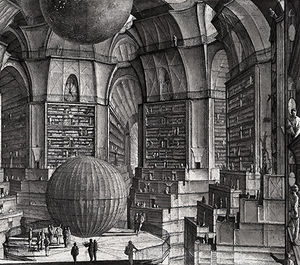Canadian Federation of Engineering Students
 | |||||||||||
| Origin: | The Garden of Forking Paths, 1944 | ||||||||||
|---|---|---|---|---|---|---|---|---|---|---|---|
| Jorge Luis Borges' Library of Babel | |||||||||||
| |||||||||||
The Canadian Federation of Engineering Students (CFES) (Fédération canadienne étudiante de génie in French) is the national association of undergraduate engineering student societies in Canada and exists to organize activities, provide services and interact with professional and other bodies at the national and international level for the benefit of Canadian engineering students. The organization is a bilingual non-profit corporation based in Ottawa, Ontario, Canada, managed by a volunteer team of engineering students and recent graduates from across Canada.
Representation
CFES Congress
The flagship event of the CFES, Congress serves as both the Annual General Meeting of the Federation, as well as a leadership development forum for engineering students from across Canada. Congress is typically held in the first week or January, spanning a full week of leadership development sessions, informational presentations, guest speakers from industry, a career fair and culminating in plenary, the decision making body of the CFES. At congress, the CFES National Executive and other officer positions are elected, and bids are made to host other CFES activities.
CFES Congress has two primary functions. First, it is a bilingual annual general meeting for The Canadian Federation of Engineering Students. Delegates discuss student council best practices and bring home actionable ideas to improve the students’ experience in engineering. The second function is to further develop our student leaders; the delegates attend workshops hosted by both experienced students and event sponsors.
Section2
The story repeats the theme of Borges' 1939 essay "The Total Library" ("La biblioteca total"), which in turn acknowledges the earlier development of this theme by Kurd Lasswitz in his 1901 story "The Universal Library" ("Die Universalbibliothek"): There should be at least 5 members serving at the bar at a time; however less are needed in the first hour of Blues Pub on average.
- Pullquote
- Certain examples that Aristotle attributes to Democritus and Leucippus clearly prefigure it, but its belated inventor is Gustav Theodor Fechner, and its first exponent, Kurd Lasswitz. [...] In his book The Race with the Tortoise (Berlin, 1919), Dr Theodor Wolff suggests that it is a derivation from, or a parody of, Ramón Llull's thinking machine [...T]he elements of his game are the universal orthographic symbols, not the words of a language [...] Lasswitz arrives at twenty-five symbols (twenty-two letters, the space, the period, the comma), whose recombinations and repetitions encompass everything possible to express in all languages. The totality of such variations would form a Total Library of astronomical size. Lasswitz urges mankind to construct that inhuman library, which chance would organize and which would eliminate intelligence. (Wolff's The Race with the Tortoise expounds the execution and the dimensions of that impossible enterprise.)
More tools
Here's a popout pdf